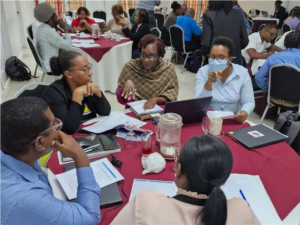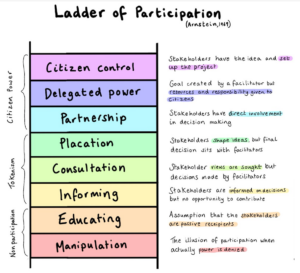Adapting to Climate Change Must Involve All Actors in Society
Governmental Actors Are Often Leading the Process of National Adaptation Planning. However, the Inclusion of Diverse Civil Society Organisations into the NAP Process Ensures Relevance and Wider Ownership towards Transformational Adaptation!

Civil Society Organisations (CSOs), rooted in local contexts, are uniquely positioned to drive equitable and effective adaptation for disproportionately affected communities. Their strengths lie in their proximity to frontline communities, experience with marginalised groups, and the ability to bridge knowledge gaps in national adaptation planning processes.
Globally, CSOs have come to occupy increasingly important roles in climate change governance across scales (see also Krishnan 2020; Nulman 2015). By representing the voices and concerns of diverse groups of people, including indigenous, marginalised and vulnerable communities, CSOs and CSO networks have engaged with regional, national and international processes such as the climate negotiations in the UNFCCC to push for new laws, initiatives and programs at local, regional and international scales. Accordingly, several governments have acknowledged the importance and relevance of engaging with CSOs as well as private sector actors (Crawford et al. 2020) in their National Adaptation Plans (NAPs) (see UNESCO 2024).
The NAP process itself is divided into three elements – Planning, Implementation and Monitoring, Evaluation and Learning (MEL), with six enabling factors contributing to each of these elements: Financing, Leadership, Institutional Arrangements, Knowledge, Data and Communications, Skills and Capacities and Engagement.
Effective stakeholder participation is central, contributing to the enabling factors across the three elements of the NAP process. In their work with national governments, the National Adaptation Plan Global Network (NAP GN) realised that even when governments were interested in engaging collaboratively with CSOs, barriers to meaningful inclusion may exist. Therefore, PlanAdapt is supporting the NAP GN to develop a series of capacity development modules to enhance CSO engagement in NAP processes.
Our team draws on its extensive experience in developing and facilitating training and capacity development programs, supporting National Adaptation Plan processes in Lebanon, Cambodia, Albania, Thailand and Bangladesh, as well as previous work on climate adaptation-focused capacity building and advocacy approaches by CSOs.
PlanAdapt’s approach combines equitable approaches to knowledge transfer and mobilisation, interactive exercises, experiential learning tools, and real-world case studies. It is intended to serve as a road map for CSOs to engage in NAP policy process, orienting participants to key concepts and approaches while enabling further exploration. We develop training modules across four main priority areas:
- Foundational understanding of adaptation to climate change,
- Engagement with the NAP Process,
- Capacity strengthening to advocate for gender-responsive and socially inclusive adaptation planning, and
- Developing effective policy engagement and communications strategies.
Strengthening CSO Engagement to Build Equitable and Socially-Inclusive Adaptation Strategies

By representing the voices and concerns of marginalised and vulnerable communities, CSOs play a crucial role both in operationalising adaptation at the local level and advocating for context-specific and inclusive decision making. It is vital to take an intersectional approach, acknowledging the differentiated impacts of climate change on different communities and identities, and building this understanding into engagement with the NAP process. PlanAdapt highlights various methods for CSOs to develop equitable and inclusive climate adaptation strategies, such as participatory mapping and the ladder of participation. We also identified and highlighted the various roles that Civil Society can take in the NAP process, such as those of advocates, watchdogs, implementers, knowledge brokers, and others.
Developing Policy Engagement Strategies
We develop a module on integrating adaptation into organizational strategy, by adapting the Organizational Model Canvas for climate adaptation priorities. This is followed by a focus on helping CSOs identify, develop and implement policy engagement strategies, based on varying contexts and goals. This involved identifying windows of opportunity to exploit and how CSOs can engage with decision-makers and create spaces of influence through Policy Entrepreneurship. This is accompanied by a nuanced look at how power structures and dynamics shape policy priorities, and how best CSOs can deal with this through appropriate stakeholder engagement and management strategy, and developing campaigns and engagement plans.
Finally, we highlight the need for effective communications strategies and crafting compelling narratives for policy. We emphasise the role of climate information and visuals in portraying the need for just and inclusive adaptation.
